|
Reminder:
An IDES representative will conduct the final on-site group meetings at 11 a.m. and noon in the Wilson Hall One West conference room on Friday, March 28.
New furlough information, including an up-to-date Q&A section, appears on the furlough Web pages daily.
|
Thursday, March 27
- Santa Fe black bean
- Sloppy Joe
- Chicken cordon blue
- Smart Cuisine: spinach enchiladas
- Baked ham & swiss on a ciabatta toll
- Assorted pizza slices
- Crispy fried chicken ranch salad
*Carb restricted alternative
Wilson Hall Cafe menu |
|
Thursday, March 27
Dinner
- Closed
Wednesday, April 2
Lunch
- Enchilada de pollo
- Ensalada Mexicana
- Pineapple flan
Chez Leon menu
Call x4598 to make your reservation. |
|
|
symmetry expands online presence, features new blog
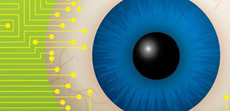
symmetry magazine now provides more online content while it saves money by publishing fewer print issues.
From the symmetry editor:
This week's distribution of the new issue of symmetry launches the next phase of the magazine's development. Our readers now use the magazine in different ways, and we are reaching a much larger audience. While readers are outspoken in wanting to keep the print magazine, many of them are now more comfortable reading online.
Starting from this issue, we will publish six print issues each year instead of 10 and add a much larger range of online content, saving money in the process. We have completely redesigned our Web site to accommodate this expansion. Our hope is that this will give readers new ways to respond and become active members of the symmetry community.
We still plan to cover the same kinds of topics in the magazine, but will be adding online resources we think readers will find useful, including backgrounders and fact sheets on many topics.
Online, we will be posting new content on a regular basis, a few times per week at least. The new online section, called symmetry breaking, will have the latest stories and discussions on topics ranging from research and news to policy and analysis. Of course, there will still be plenty of the fun stories that are a hallmark of the magazine.
Bubbling away in the background, we already have a symmetry Facebook group and YouTube channel and expect to see them become more active in coming months. We will be soliciting science videos and photographs for contests, and looking for other materials from the very creative minds of our readers that deserve a wider audience. As always, if you would like to see us address a particular topic or have ideas you think will appeal to fellow readers, please let us know.
This next phase of symmetry is very exciting for our team, and we hope you will all join in.
-- David Harris, symmetry editor
|
The science of illusion
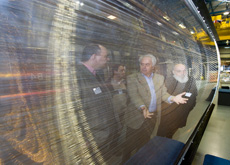
CDF's Luciano Ristori (center) gives a tour Tuesday of the facility to Gordon Meyer (left), technical writer at Apple Computers; Eugene Burger (right), Chicago-based magician; and
Jack Gould (not pictured), professor and former dean at of the Graduate School of Business at
the University of Chicago. Ristori, a magic enthusiast, met Burger on a trip to Rome and offered the magician a tour of the laboratory.
|
Phishing threat results in
zip attachment blockage
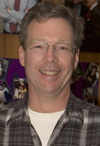 |
| Mark Leininger, computer security manager |
A recent phishing e-mail exploit has resulted in several compromises at other laboratories. As a short term defensive measure, the laboratory is blocking e-mails with zip attachments. The restriction, announced in the March 25 Computing Division News column, will be lifted when other defensive measures are put in place. The subject currently used in the phishing e-mail is "Project Data Summary Report." The e-mail contains a URL and zip attachment. Following the link or opening the attachment can result in a compromise of the machine. Please remember that e-mail can easily be crafted to appear as though it was sent by someone you know or from a list that you subscribe to. If the message doesn't seem authentic or anything about it doesn't seem right, don't click on links and don't open attachments. If you follow a link or open an attachment that you suspect is from an illegitimate source, please report the incident to your system administrator or call the helpdesk at x2345, so they can check your machine.
--Mark Leininger, computer security manager
|
Science, art fuse in lightning-like creation
From Beacon News,
March 26, 2008
So how do you grow an electron tree?
Simply release millions of volts of electricity into a block of acrylic plastic -- and watch the growing process begin.
"Suddenly the whole thing bursts out and there's a flash of light and the electrons disperse through the plastic. It takes 100-billionth of a second to produce this," explained Fermi National Accelerator Laboratory scientist Todd Johnson.
A group of youngsters on a spring break trip to the SciTech Museum in downtown Aurora had the rare opportunity of seeing how science can replicate the natural forces of a lightning bolt -- and create a beautiful branching pattern called a Lichtenberg figure or "electron tree."
The figure is named after Georg Christoph Lichtenberg, who in 1777 discovered the basic principle of modern xerographic copying. The images he reproduced are called Lichtenberg figures.
"These are not very common even now," Johnson said of the 3-dimensional Lichtenberg figures, which take some serious hardware to produce.
Johnson travels out-of-state a couple times a year for use of a 5-million-volt particle accelerator to infuse millions of volts of electrons into the blocks of acrylic plastic.
"The patterns follow the same rules as if lightning strikes a golf green," the high-voltage hobbyist said.
Read more
|
|
|
Shedding new light
on an old problem
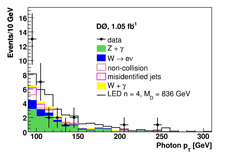
This figure shows the transverse photon momentum in large extra dimension candidate events. The additional rate of signal events is shown in the open histogram along with the expected backgrounds.
When it comes to particle interactions, the force of gravity is an oddity. It is also entirely absent from the Standard Model theory. Although gravity is an undeniable force in our everyday life and dominates interactions on the cosmological scale, it is by far the weakest force at the particle level and has never been successfully integrated in a quantum description of the universe. Theorists have attempted to fill this glaring hole in the SM by supposing that gravity's weakness arises because of the presence of large extra spatial dimensions. Because we don't observe them on a daily basis, these extra dimensions would have to be compactified (or curled up). If normal elementary particles were confined to our three dimensions, we could explain gravity's weakness by its dilution in these large extra dimensions (LEDs). This theory, if true, would shed light on one of the greatest mysteries of modern physics.
Fermilab's Tevatron collider might allow scientists to see into these extra dimensions. A particle known as a Kaluza-Klein graviton would act as a physical signature of LEDs. The stable graviton would not interact with the detector material. The momentum conservation requirement over all particles in the interaction would signal its presence. Researchers at the DZero experiment have recently completed a search for LEDs in events with a single photon and missing energy. Because these events have a very well-defined energy resolution they can form a precise test of LED theories.
In just over one inverse femtobarn of data, DZero researchers found no evidence for LEDs. Though direct gravity measurements can only probe length scales of a few hundred microns, this search provides a probe of extra dimension scales down to a millimeter if there are just two dimensions and sub-atomic length scales for up to eight dimensions.
These results are a significant improvement over previously published Tevatron LED results. Searching for LEDs with a single photon is a valuable technique for DZero researchers, and they will continue their search as the Tevatron delivers more data. With luck, this search could shed light on the fundamental nature of gravity, one of our oldest mysteries.
Read more
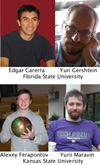 |
This team of DZero collaborators made primary contributions to this analysis. |
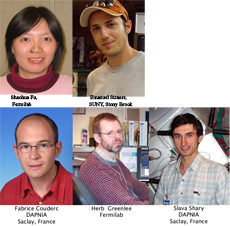
DZero's Common Samples Group works to ensure that the data and simulated events are made available in a robust and uniform manner. Their efforts eliminate many of the obstacles involved with performing analysis in the large (and growing) DZero data set.
Result of the Week Archive
|
|
Have a safe day!
IDES representative on site Friday
A representative from Illinois Department of Employment Security will be on site in the Wilson Hall One West conference room for the last on site visit Friday, March 28. Due to the increase in attendance, two larger group meetings will occur at 11 a.m. and 12 p.m. If you are beginning your furlough week, please fill out a benefit application on site. You may also apply for benefits online or at your local IDES office the week you are on furlough. Please contact Heather Sidman x3326 or Jeannelle Smith x4367 with questions.
Standard mileage reimbursement rate
The Internal Revenue Service and the General Services Administration have
issued the 2008 standard mileage reimbursement rates as 50.5 cents per
mile, effective March 19, 2008.
SciTech summer camps
The SciTech Hands-on Museum offers Science Adventure Camps for children
age 6-8 and age 9+. Week-long camps begin on June 23 and run from 9 a.m.
to 3 p.m. Fees range from $200 to $225 per week. Before- and after-care is available for an extra fee. For more information, visit the SciTech Web site.
DreamWeaver CS3: Advanced
Web site developers, Web site designers,
marketing managers, Web graphic artists and Web site administrators can take an advanced class in DreamWeaver CS3. Learn more and enroll
Additional Activities |
|





